Don't wanna be here? Send us removal request.
Text
Velma Wrapup: On Adult Comedy
Hey fam. I know this is mad late, but let’s be honest, trying to write a wrapup on Velma was about as painful as watching it. Enjoy!
---
So speaking of HBO, I just watched Marc Maron’s From Bleak to Dark, which is one of the funniest standup routines I’ve seen in a long time.
It was also deeply dark and pretty disturbing in places.
I mean, he didn’t hold back. COVID? Auschwitz? Terminal illness? Abortion? Disinformation? Antisemitism? Suicide?
All there.
And it was funny as fuck.
-
I’m gonna keep coming back to Kurt Vonnegut here, because I think he got to the root of comedy: that all humor is based on fear. “Laughter and tears are both responses to frustration and exhaustion. I myself prefer to laugh, since there is less cleaning do to do afterward.”
From Bleak to Dark worked because of this fear. We’re exhausted. The state of the world doesn’t seem to be getting any better, and it’s just hard to navigate being human right now. How on earth can you make this material funny?
And the answer is: by reaching deep into the dark places of the soul, plucking the strings of our agonies and worst fears, and dragging them into the light. Saying: Hey, I’m human, you’re human, and here we are trapped in the mess of our humanity. I see you. Hi.
And we laugh.
Because what else are we gonna do about it?
As both Maron and Vonnegut remarked, the jokes in Auschwitz must’ve been amazing.
-
I stumbled on this essay by Matthew Morgan on the state of modern irony, and it stuck a chord:
One feature of the free mind is an ability to entertain contradictory ideas simultaneously; at its most refined, this is an appreciation of the ironic, which Schlegel showed is borne of contradiction. Albert Camus talked about the Absurd as the search for value in a valueless universe. Humans are both the only known creatures who comprehend the meaninglessness of the cosmos and the animals most insistent on discovering meaning, demonstrating that irony is at the heart of the human condition. To embrace irony is, therefore, to embrace life.
Irony, the essay points out, strikes at the contradictions of our messy lives. Vonnegut was a master of irony, using it in such a subtle way that it sailed over many peoples’ heads. In an interview with Playboy in 1973, he famously stated:
You understand, of course, that everything I say is horseshit...But it’s a useful, comforting sort of horseshit, you see? That’s what I object to about preachers. They don’t say anything to make anybody any happier, when there are all these neat lies you can tell. And everything is a lie, because our brains are two-bit computers, and we can’t get very high-grade truths out of them. But as far as improving the human condition goes, our minds are certainly up to that. That’s what they were designed to do.
Vonnegut’s comforting lies contradict the inherent meaninglessness of life; they give us something to hold onto. Something to reach out with, to show us that we understand each other. That we all want and fear. That we can form community with this shared understanding. An understanding based in irony. In the contradictions of life.
What does all this have to do with Velma? Bear with me. I’m getting there.
-
Morgan’s essay also gets at what I think is an issue with a lot of current comedy:
...social commentary has been lost amid the exponential growth of shock-value comedy, the inanity of which is exposed by its label: rather than using shock to change values, the vacuous comedy of something like Family Guy values only the shock. This kind of humour merely consolidates one’s place within the in-group of cynical cool kids by sniggering at increasingly “offensive” jokes, a sort of lack-of-virtue signalling.
...The reason that shows like Family Guy are so empty is that they want to mock everything (because that’s detached and cool) while refusing to show us anything (because that would be old-fashioned and ridiculous).
And here’s where we get to Velma.
-
High school is a weird time. Lots of teenage media would have us believe that high school is when we come into our own: amongst the parties and rebellion and teenage love and heartbreak, we are tested, and emerge from this crucible as a fully-formed person. Nothing could be further from the truth. High school is messy, ugly, and painful. It doesn’t look like what it does on the screen. The idea that ‘high school is the best years of your life’ is oft repeated, which in hindsight is horseshit. But maybe we believed that deep down, back when we were in high school, and were terrified that we were doing it wrong.
And so many of us emerge from this with scars.
There is a lot of adult media about high school kids! Because on some level, we’re all still trying to process this time of our lives. Putting it into art, stylizing it or flaying it open, helps us to do so. And for teens watching this media, hopefully we’re saying: it’s ok. This is messy ugly and painful, but you’re not alone.
I think Velma is trying to do this. Velma goes to some serious lengths to dig into this messy high school experience. It also pokes at how the media treats the high school experience, which is awesome in theory.
The problem is, it falls into a very high school sort of trap. The kind of trap that we were supposed to mature past. The kind of trap that a lot of shock comedy hasn’t matured past.
As Morgan says, it’s that Velma wants to mock high school media - because it’s detached and cool. I remember this being a thing in high school. In order to be cool, you had to be detached. You could never show real emotion or real hurt. Everything had to roll off like water on a duck’s back.
Because showing real vulnerability wasn’t cool. Cool was not caring. Cool was being able to hurt others, without showing any hurt yourself. Velma wants to skewer the idealized version of high school we see in media - but instead, it just becomes another high school bully.
And all the criticism that has been levelled at Velma? It’s rolled off. Like water on a duck’s back. HBO has renewed it for a second season.
It’s like watching your high school bully get elected class president.
-
I’m not gonna dissect the content of Velma, because enough people have done that already. The piles of shitty jokes, the weird meta commentary, the moments that don’t work, the moments that hurt - it’s all been compiled, and I don’t want to beat a dead horse (I’m the horse in this metaphor. Because dealing with Velma is painful).
But I do want to say, it’s an exquisite study on how comedy fails. Fails to reach out, fails to plunge deep into its audience and pull on its worst fears. Fails to make us seen, fails to find a shared humanity.
Doug Walker, who of all people is qualified to comment on bad comedy, probably said it best:
[Velma has] this wall of protective bullshit that's stopping it from being really funny or really clever.
And that’s that. There’s a wall. Velma is not reaching an audience, because it physically cannot.
Is it the writers’ own fears that built this wall? Fears of being mocked? Wanting to be detached and cool?
Because to make real connections, we run the risk of being hurt. Being hurt is a part of life. And the best comedy overcomes this. Says ‘Hi. I know you’re hurting. So am I. Can we make this less painful together?’
If Velma is to be believed, we cannot. All we can do is carry on hurting each other, with no connection or relief in sight.
But as good comics have shown, we can ease the pain with shared laughter.
#doing velma#velma wrapup#legit I am so sorry this is mad late#I never wanna think about this show again tbh
4 notes
·
View notes
Text
“Oh boy! Like Lion King!” - Africa, Pop Culture, and The Book of Mormon
I think we can all agree that The Book of Mormon hasn’t aged well.
It’s been twelve years since The Book of Mormon opened on Broadway, which is crazy to think about. Twelve years ago we all thought Mitt Romney was the worst thing that could happen to the US.
Two years ago the US took another look at racism. The Black production members spearheaded an effort to review the show. The goals of this review were to address the way the African characters are portrayed and to center them more in the work.
I’m not familiar with the outcome of this effort. It’s hard to find details on the show’s new look, apart from some little tidbits regarding the main female lead and her actions in the show.
But I think there is one element of The Book of Mormon that critics have been failing to address for a long time - an element that is built into the bones of the show, yet goes unnoticed.
When Elders Price and Cunningham are told where they’re going to go on their mission, we get our first glimpse:
VOICE: And your mission location is...UGANDA!
[Music stops.]
ELDER PRICE: ...Uganda?
ELDER CUNNINGHAM: UGANDA? Cool! Where is that?!
VOICE: Africa!
[Price looks visibly upset, but then bucks up and tries to rally himself.]
ELDER CUNNINGHAM: Oh BOY - like Lion King!
and few pages in the script later:
PRICE’S DAD: ...You’re heading...TO AFRICA!!!!!
[The families make it offstage. The lights go dark and a spot comes up on a Lion King-like character who enters stage.]
LION KING CHARACTER: Hey na da hey na! Aya bubbu taya tayaaaaaa! Haiyaaaa tayaaaa mala ennyaaaaaa! Hey naaa naaa naaa da hayaaa!
[Finally the lights come up, the families are back, and we are STILL at the airport.]
PRICE’S DAD: How did you like THAT, boys?! A real LION KING SEND-OFF! We got Mrs Brown to sing like an African for you.
ELDER PRICE: That’s great dad, thanks.
LION KING CHARACTER: [Waving] Good luck, boys! I’ve never been to Africa, but I’m sure it’s a hoot!
The only thing Americans know about Africa is Lion King. The show is hammering this point home to us.
We’re immediately set up to think of Africa through a pop cultural lens. And as soon as the Elders get to Uganda, we’re immediately shown a different image of Africa: poverty, militia violence, and AIDS.
This is another idea of Africa rooted in American pop culture. Yes, these things exist in Africa, but Africa is a much more diverse and dynamic place that American pop culture gives it credit for.
And yet, we’re presented with two takes on Africa heavily rooted in American pop culture. The Africa we’re shown in The Book of Mormon is not authentic. I don’t believe this is an accident! I don’t believe this is a lazy American team failing to understand what really makes Africa.
Pop culture is a theme woven throughout the show, besides the constant Lion King jokes. When Elder Cunningham forgets his Mormon theology, he falls back on pop culture, like Star Wars and Lord of the Rings. By weaving pop culture into his missionary work, he finds himself successfully getting through to the Ugandan villagers where the other Mormon missionaries have failed.
And in the end, the converted villagers present a new story of Joseph Smith, one built with the pop culture they’ve been introduced to.
After all, the show asks, are religious stories not just another form of pop culture? Our myths, our legends, the stories that inform our lives - whether they be out of a religious document or owned by Disney, it’s the stories we tell that make life meaningful. And when we no longer find meaning in these stories, we can adapt and change them to make new meaning.
It’s the stories we tell that are powerful - powerful enough to inform Americans’ view of a whole continent.
In The Book of Mormon, we’re presented with a pop cultural version of Africa. But unlike most American media that depicts Africa in this way, we’re asked to examine our conceptions and where they come from, and how they do not reflect reality.
Unfortunately, I don’t think the show is successful in asking this question.
The Book of Mormon is frequently called out for its depictions and treatment of Africa and the African characters. And rightfully so. The African characters come off as primitive, disease-ridden, and sexually violent. In many ways, I think, the show is trying to critique these stereotypes. But it does not speak loudly enough against them in order to do so.
The problem with offering up an Africa that is built on American pop culture, is that we aren’t given an alternative to this lens. We aren’t given any material to compare against a pop cultural depiction. Why would we question the stereotypes when the show doesn’t give us any reason to? Telling us that we’re in a world informed by pop culture isn’t enough. We need a way to break through this depiction, and come closer to something resembling authenticity.
After all, this show talks about the power of communal story-telling. But theatre is another form of communal story-telling. And when they’re telling us a story about an Africa that is dirty, brutal, and desperate - we have no material to build a new story out of.
The reason all the missionaries before our protagonists failed - they offered nothing new, nothing that is relevant or can speak to the villagers.
And the audience is being offered nothing new either.
Is it even ethical to depict people based on how American popular culture views them? I don’t have a great answer to this. When it comes down to it, The Book of Mormon tries to tell us that we don’t know anything about Africa by showing us what we think we know. All we know are tired stereotypes.
One of the songs leading up to the finale, “I am Africa”, ridicules this:
MISSION PRESIDENT: Elders of District 9! You have truly honored the church by your success! Congratulations on becoming ONE with the people of Africa!
ELDER MICKINLEY: I am Africa...
I am Africa.
With the strength of the cheetah,
my native voice shall sing.
ELDERS: We are Africa! We are the heartbeat of Africa!
With the rhino, the meerkat, the noble lion king.
We are the winds of the Serengeti,
we are the sweat of the jungle man,
we are the tears of Nelson Mandela -
we are the lost boys of the Sudan.
All this time in Africa, and the missionaries and the audience still know shit about Africa. This song is laughing at the audience as much as it is laughing at the missionaries.
The curtain falls, the audience smiles and leaves, and we still know shit about Africa. The show has pointed this out again and again. But this message gets lost. I know it’s gotten lost because I’ve never seen this offered as a critical lens. To viewers, the show is either fun and weirdly wholesome, or it’s offensive.
Is it ethical to offer up a depiction based on American pop culture, when we’re missing the fact that what we’re being offered is inauthentic?
Nobody was asking these questions in 2011. But that was twelve years ago, and our expectations for media are changing. The Book of Mormon was a product of its time. I don’t think it could become an unquestioned hit today. That’s ok. There will be more media. More chances to ask:
How can American media truly do Africa - a giant, bustling, diverse, whole continent - justice?
And more chances to answer.
-
[All show dialogue is taken from the script book, published by Newmarket Press in 2011. A lot of the dialogue is written in caps, which I have frequently removed to improve legibility.]
#the book of mormon#other media#I've actually been wanting to write this essay for years cheers guys#I promise that the projects in the works are coming soon!
24 notes
·
View notes
Link
Gita Jackson talks Hogwarts Legacy within the context of the franchise, and its limits and possible future.
0 notes
Text
Jewish Kids Fantasy
Today at work, I found a book on the counter.
Miss Peregrine’s Home for Peculiar Children. I have no idea why it was on the counter, but it’s my boss’s kid’s favorite book and he’s been telling me for years that I need to read it, so I took the opportunity. And I was blown away! Can’t wait to discuss it with him.
But if you want an amazing example of Jewishness and antisemitism worked into a YA fantasy story, this is your book.
The novel opens with our protagonist, Jacob, talking about his grandfather Abraham’s stories. Abraham tells fantastical stories about his childhood, when his parents sent him away from Poland to escape the Nazis. He wound up in a children’s home in Wales. His stories of this children’s home are populated by children with magical abilities, a wise bird who looks after them, and the man-eating monsters that he fled from.
As Jacob grows older, he dismisses these stories as fantasies made up to cope with being a refugee. Which makes a ton of sense. The severe trauma of losing your family and being sent to a strange country--then to grow up, fight in the war, and learn that your family didn’t survive--why wouldn’t a survivor turn it into a faery story for a young grandchild?
The novel doesn’t shy away from addressing the generational trauma caused by the Holocaust. Abraham starts a family after the war, yet is constantly travelling and rarely sees his children, who later find love letters from a mysterious woman. Jacob’s father is obviously burdened by this emotional neglect, and his cynicism about his father vs Jacob’s starry-eyed love for Abraham provides a background character conflict.
After Jacob witnesses Abraham’s death by the hands of a monster right out of one of those childhood tales, he decides to track down the truth about the children’s home. He and his father travel to Wales, where he finds the fantastical home and the magical children, protected forever in a pocket of time. Miss Peregrine, the guardian of the home, tells Jacob about people with strange abilities - “Peculiars” - of whom he and Abraham belong to. Jacob and Abraham both have the unique power to see the monsters (Hallowghast) that hunt and devour Peculiars, and Jacob learns that Abraham spent his life after the war tracking those monsters down and killing them.
The Peculiars and the Hallowghast are used as an allegory for Jewish persecution and antisemitism. Peculiars all over the world have retreated into loops of time to protect against persecution from humanity. Meanwhile, the invisible Hallowghast hunt them down. Hallowghast are mere beasts, but if a Hallowghast kills and devours enough Peculiars, it transforms into a Wight - an intelligent creature that can blend into society and organizes the Hallows to track down and destroy more Peculiars.
And it’s no mistake that the only two characters in the book that have the power to see the monsters for what they are - are the Jewish ones.
Antisemitism is a pervasive thing. There are the antisemitic tropes and stereotypes. There’s been a lot of talk on tumblr about learning to recognize these in both media and everyday life, and I’m hearted to see people discussing what everyday antisemitism looks like. But unless you’re Jewish, you likely didn’t grow up learning to recognize them. They’re everywhere - invisible but present in media, in the news, on social media, and in institutions. Like the Hallowghast, they are invisible monsters that can hurt and kill - and it takes someone who is looking for them to spot them.
The Wights, on the other hand, are far more insidious. They blend into society, looking like a normal person, organizing the everyday monsters. This is our systemic antisemitism. Universities putting quotas on Jewish students. Employers who don’t want to hire Jews. Pogroms. Exile. Inquisition. Ghettos. Genocide.
Abraham is heavily implied to be the only Jewish child at the house. He leaves the safety of the loop - and forfeits his place there forever - because he wants to fight against the ones hurting his people. In WWII, the Nazis. After - the Hallowghasts. Because he belongs to two marginalized peoples, he feels that he cannot sit back and let either be terrorized. The other children - for whom the Hallowghast are invisible - do not make this choice, probably because they do not see the consequences of ignoring it.
This is a particularly interesting point to me, because often when Jewish characters are in fantasy stories, they do not have to deal with how their Jewishness does - or does not - fit into the fantasy world they’re given access to. Whereas Abraham grapples with how he fits as a Jew into the world of the Peculiars. He decides that he cannot sit idly by while his people are killed, and this decision sets up the one that Jacob will have to make. Does he abandon the Peculiars to the Hallowghasts, or will he fight for his newly-found family?
In the end, perhaps inspired by Abraham’s example, Jacob does. He leaves his father, leaves his time period, and sets off with the other Peculiar children to confront this threat.
“Do not be daunted by the enormity of the world’s grief. Do justly, now. Love mercy, now. Walk humbly, now. You are not obligated to complete the work, but neither are you free to abandon it.”
-Rabbi Tarfon, Pirkei Avot 2.16
It is this Jewish value that guides the text. Abraham and Jacob both fight for their people, fight for freedom from persecution. Freedom from the monsters in human form.
And that, my friends, is how you successfully integrate Jewishness into a YA Fantasy novel.
124 notes
·
View notes
Link
Thought this was a decent enough critique. Just, don’t look in the comments.
2 notes
·
View notes
Text
Velma Last Eps
Got my emotional support snacks:
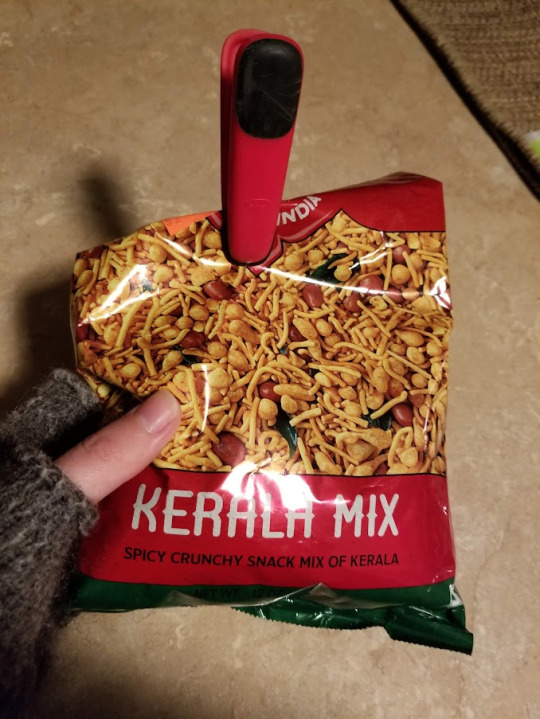
I gotta hand it to the writers, they did this mystery better than BBC Sherlock.
That might be a low bar, but they did clear it.
Most of the background info needed for the mystery had been set up in previous episodes, and there were only a few more elements introduced to solve things. These last two eps were not boring, there were a fair few twists that work for keeping viewers on their toes, and it was wrapped up pretty well, while leaving plenty for a second season (oh G-d help) to explore.
Some character development did happen in the end, even if it was in an extremely messy and sudden way. You could understand how the characters got to their current points. It was - sudden. The characters were almost exactly the same way as they were halfway thru the series - then all of a sudden, hey! Look! Development! They haven’t turned into good people, or even people resembling their classic counterparts, but they did change, and character conflicts were set up for the second season.
One thing that didn’t change at all in these last eps? The writers doing really ham-fisted social commentary in character monologues. The ‘rich white man privilege’ actually did have a bit of plot relevance in the end, but it was still about as subtle as getting slapped in the face with a disembodied brain.
I want to take ‘snide quip about social issues’ out of these writers’ toolbox. It would make a better show for it. These things bog down the pace, they make the audience cringe, and they land so poorly. Like, yeah, Charlie Grandy, we get it, you’re a self-aware white guy.
One thing I am glad about tho: Velma has treated her friends like shit this entire show. And she does wind up suffering consequences for it! Norville leaves her, and we get the feeling Daphne’s reached a breaking point. It woulda been cool for these consequences to have come sooner. These characters are fucking martyrs for putting up with Velma. If consequences had come for her earlier in the show, we might’ve had more time for character growth earlier on. One of the biggest problem that reviewers have had is that Velma honestly sucks to spend time with. It might’ve helped a lot if this had been acknowledged more and she had been given more moments that hint to future growth.
Honestly Velma does make me sad. I could see myself enjoying this series a lot. There’s a ton of potential, and it’s been wasted. The problems are all in the writing room. And I don’t know if the reviews from this season will inspire them to make change, but it would be incredible if that happened.
Not holding my breath though. Because the problems we see with this show are problems of extreme arrogance. Which, as ironically demonstrated through the show’s villains, is not the kind of thing that changes when confronted with its own folly.
1 note
·
View note
Text
Last Velma eps tonight! So glad to almost be done with this one, it’s been a legit slog.
At least, until a season 2 comes out. I don’t wanna think about that right now.
Anyway, The AV Club (the only outlet that actually had a positive review for this thing) put out a new article today on South Asian women in television.
Honestly, before I read this, I’d’ve been hard-pressed to name shows with South Asian women other than The Big Bang Theory (nope) and Mindy Kaling’s projects. It’s nice to know there are other things out there (I’d forgotten Kamala Khan has her own show these days).
But it’s still not enough. And frankly, we’re all beating around the bush when we say ‘South Asian’. I think Kamala Khan is the only television character to be explicitly Pakistani and Muslim. South Asia has a ton of diversity (linguistic, ethnic, religious, economic, caste-based), and yet we are only shown a very specific kind of South Asian woman on television. She’s usually upper middle class, vaguely Hindu (but actually secular, her religion is never shown to be a part of her life), with educated and successful (and strict) parents, and nothing else. In American television, we’re given more of a pop-culture version of South Asian women, instead of portraits of real people. Velma is no different in this case. The only things we get about her South Asian-American identity are (insulting) jokes about her body hair, and jokes about how all brown people are conflated as being Mexican.
So what even is the point of making Velma South Asian? Honestly, I think it’s only because of Mindy Kaling’s involvement. I don’t believe Velma even counts as South Asian representation, because she’s not representative of any kind of South Asian-American experience.
The only real thing that has come out of Velma’s being South Asian is the publicity from Mindy Kaling, and the right wing backlash.
South Asian women deserve better from American television.
3 notes
·
View notes
Text
So, as people are seeing the pretty extreme antisemitism in the new terf wizard game, it should be noted that this was not a case of "following existing antisemitic fantasy tropes". This was purposeful. The ex lead designer is alt right and ran an alt right "anti social justice" youtube channel. The discovery of this channel and the resulting controversy lead to him later being removed from the project late in development but the main premise of the game was determined by him and others with his views. The core concept of this game is antisemitic and fully intended to be. It is not a case of thoughtless devs or lack of cultural sensitivity. This game is intended to be antisemitic propaganda designed and developed by openly alt right devs.
56K notes
·
View notes
Text
I touched real grass today* and am still annoyed about this, so here we go:
We cannot pretend Hogwarts Legacy doesn’t exist.
I have seen so many posts saying that “if you talk about this, you cannot be a real ally. Playing and talking about this game will do real harm to real people. Do not support Hogwarts Legacy.”
And why does this make me angry? Because it’s reductive and doesn’t acknowledge the real world we live in.
Let’s start with the basics: paying for the game financially supports WB and JKR. A boycott aims to harm someone financially, and I believe that not paying for this game is a good goal, with some real measurable results.
But I’ve seen as many posts condemning someone who would pirate the game. Pirating, which WB Media will count as a loss, doesn’t put money in JKR’s pocket, and therefore accomplishes the goal of a boycott: to hurt someone financially.
What is the goal of convincing people not to pirate the game? To make sure that people don’t play it? To make sure that people don’t talk about it?
I cannot condone this. Because Hogwarts Legacy will not go away, and it is important to talk about it.
Hogwarts Legacy is going to be one of the biggest games of the year, if not the biggest. Presales are through the roof. Millions of people are going to be playing this thing. It is not a commercial failure. It is not going to go away.
By silencing talk about Hogwarts legacy, we are silencing ourselves.
It is important to have a voice in this conversation. By trying to silence all talk about this game, we are shutting down critical discourse. Can a person effectively criticize a piece of media without engaging with it? Because a person plays this game, does that mean they are disqualified from bringing meaningful critical dialogue to the table?
If meaningful critique about this game is not offered, how can we expect to reach people? How can someone expand their thinking if the tools to expand it are not there?
There is so much talk about how engaging with Hogwarts Legacy will bring harm to real people. It is important to think about how our actions can do harm.
But critical engagement is not harmful.
And right now, the gaming press is not providing it.
As I write this (Feb 7 2023), the major outlets (at least the ones willing to touch it) have dropped their reviews. They almost all add some sort of sidebar disclaimer: We do not support JKR’s views on trans people. We support human rights and support people speaking with their wallets. Etc.
Cool, ok. Are they talking about the plot of the game? The thing that Jews are worried is going to be “Blood Libel Simulator 2023″? No they are not. How are we Jews going to push back on antisemitic content in this game if we don’t even know what’s in it? We need to be able to address what this game is going to be implying about us. Antisemitism is on the rise globally. I am scared for my Jewish family. I had to listen to a Gentile relative tell me over Christmas that Kanye was a ‘genius’.
Again, millions of people are going to be playing this. Not talking about any antisemitic tropes in it is only going to help them go unchallenged.
Critical works on Harry Potter are valuable.
Over the past few years, there has been an exceptional body of work put out that returns to Harry Potter. Takes a look at the books with a new eye, an eye that is more attuned to the casual cruelty JKR wields. Examines elements that we brushed over as children. Contextualizes Harry Potter in its British Neoliberal context, and points out the moral failings of JKR’s allegories. Realizes how Harry Potter does not call for true revolution, but merely a comfortable status quo.
Critical works like these have helped so many reevaluate Harry Potter with a more mature view. By looking at JKR’s output, we are better able to understand her current bigotry and call her on her views. Trans analyses of the books have highlighted transphobic material that went unremarked upon in the 2000s.
Why stop here?
Is it because talking about the game supports JKR? Or is it because people are condemning anyone who even thinks about talking about the game?
I know I’ve seen a million posts on my dash along these lines. “I don’t trust you if you play this game. I will block you if you talk about this game. You are not an ally if you talk about this game.”
And this, this makes me angry.
Because I know you’re trying to reach people who will pay for the game without thinking about who that money goes to. People who will not acknowledge the real terror JKR is inflicting on trans people. People who will say “let me enjoy the thing.”
But you’re not just reaching them. You’re also saying, in effect, “any talk about this game will get you shunned, blacklisted, harassed. Engaging with this game means that you are not a good person. Good people don’t talk about Harry Potter anymore.”
Aren’t we always banging on against online purity culture? Saying that media consumption is not activism, and that you don’t get to be a good person just by consuming the “right” media? Because right now, you’re saying the opposite. That media consumption is activism. That you are a good person because you don’t consume the bad media. That any talk about this does real harm to people.
And to be clear, I’m not talking about personal blocklists. Curating your online space and blocking stuff that you don’t want to see is not the problem here. The problem is the rather explicit statement that anyone who talks about Hogwarts Legacy is immoral.
And as a media critic, and a Jewish queer, I cannot accept this.
We must talk about the things that hurt us. We must continue pushing back against the bigotry of the Wizarding World. We must have a voice at the table, because no one is going to do it for us. Not the gaming press, not the suits at WB, and certainly not the world that produced millions of preorders for this game.
Once again, we cannot pretend Hogwarts Legacy doesn’t exist. The real question is: how will we talk about it?
Because if we’re not talking about it, someone else will be.
*A feat in a New England winter. Said grass was in a greenhouse.
#hogwarts legacy#jk rowling#harry potter#media criticism#doing hogwarts legacy#antisemitism#transphobia
174 notes
·
View notes
Text
So I DON’T HAVE POLLS YET, but if I did, which would you be more interested in?
Analysis of Velma through the lens of Sarah Z’s ‘sacrificial trash’ concept
or
Analysis of Velma through the lens of nostalgia reboots of kids properties for adults, and comparisons to Riverdale
5 notes
·
View notes
Note
love your avatar 👀
ahaha thanks xD I really had no idea what to use, so I decided to make the default cone a little angry guy for now. It was intended as a placeholder but ngl I'm getting kinda attached
0 notes
Text
man this is...this is getting painful.
like even more painful.
I think they’re trying to do a character arc for Velma, but it’s not really working because she’ll just acknowledge that she has sucked in the past, then continues to suck in the exact same ways? These writers rlly struggle with the show not tell.
Ep 7 was a mess. Tired critiques about gender expectations. The commentary here was old, old, and moldy. Men are held to lower standards and praised for mediocrity, we get it.
Random tonal whiplash into a chase scene (with the doors) that was well animated and designed as an homage, but it didn’t land well, considering that it was squished in between some much more serious scenes.
Ep 8 got kind of meta with how flashbacks are structured on TV, and I felt like this joke was carried pretty well.
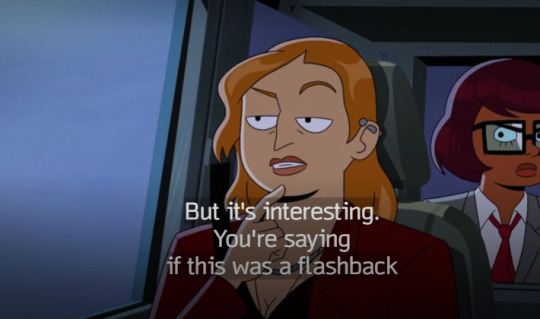
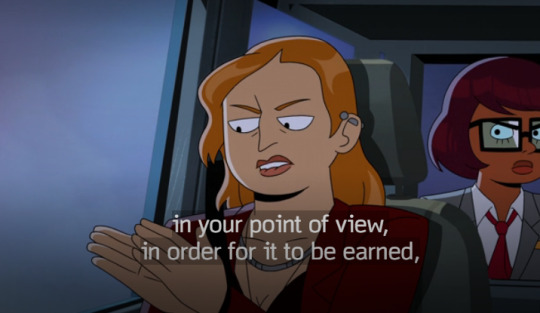
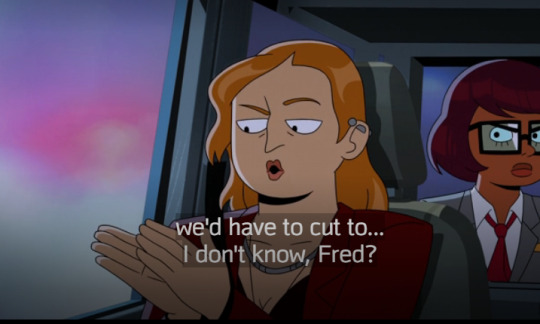
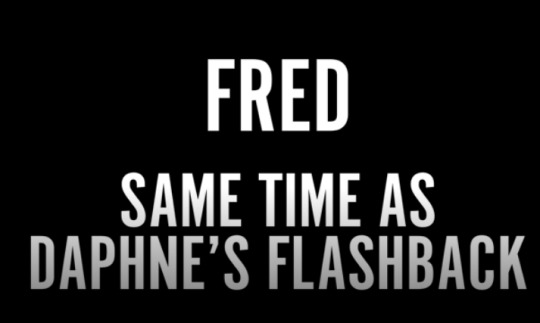
I laughed, and I don’t feel like this joke overstayed its welcome. It was a cute way to combine the overlapping flashbacks, and it wasn’t trying to be An Important Commentary, it was just meta and silly. The rest of the episode? Nope.
So much of this show is the writers trying to be Important. Velma is not Important. If the writers room took their heads out of their asses, I think they could’ve found success. I think they think that an Adult Spinoff has to make Important Social Commentary, but it really doesn’t. It just has to play with the characters and themes in a more adult way. Velma isn’t here to play. Watching this show is like being peer pressured by the writers into laughing.
Don’t have much to say tonight. A lot of this gets really repetitive. Do the writers think we have the attention span of a goldfish? You can show a character being obsessive without having them just constantly repeat lines about the thing they’re obsessed with.
Yeah I think you can tell I’m tired. Why did I do this again? How many eps do we even have left?
3 notes
·
View notes
Text
Velma Week 3
Interestingly enough, this show is actually getting better.
And a great deal of laughter is induced by fear. I was working on a funny television series years ago. We were trying to put a show together that, as a basic principle, mentioned death in every episode and that this ingredient would make any laughter deeper without the audience's realizing how we were inducing belly laughs.
There is a superficial sort of laughter. Bob Hope, for example, was not really a humorist. He was a comedian with very thin stuff, never mentioning anything troubling. I used to laugh my head off at Laurel and Hardy. There is terrible tragedy there somehow. These men are too sweet to survive in this world and are in terrible danger all the time. They could be so easily killed.
--Kurt Vonnegut, A Man Without a Country
Since Doug Walker hit me over the head with his line about Velma hiding behind ‘a wall of protective bullshit’, I’ve been thinking a lot about the nature of comedy. So much comedy is based on vulnerability, and Velma’s writers up until now have been afraid to be vulnerable with the audience. Jokes land like porcupine spikes, coming from a place of defensiveness, almost like they’re daring the audience to do anything but laugh. And in this situation, instead of opening up, laughing deeply and with our whole heart, we wince. Cringe away. Clam up. So many people have said this show is difficult to watch because of the painful attempts at humor.
Not pain as in pathos. Pain as in stubbing our toe and being frustrated at the lack of meaning behind it.
But this week, we actually got a bit of opening up and vulnerability. And eps 5 and 6 weren’t absolutely dreadful.
Of course, like any story revolving around high school kids, this vulnerability comes in the form of family.
If there’s one thing teen dramas get right, it’s that nothing is ever actually a teenager’s fault. We’re all really just paying for the sins of our parents. They’re either lying to us - or trying to change us - or hiding some dark family secret. But when it comes to truly crappy parents, no one beats my dad.
--Episode 6 opening
Episode 6 deals greatly with parents. Velma begins spending time with her father and having fun, after realizing that she does actually want his approval. Fred fights against his father’s attempts to mold him. Norville [proto-Shaggy] starts rebelling against his parents for the first time in his life. And Daphne meets her birth parents.
And the writers lean into this! They give the characters time to express their feelings without leaning on snark. We see these relationships develop and change over the course of the episodes. And as a result of this emotional opening? The jokes start landing. I definitely laughed more tonight than the past two episode drops combined.
Episode 5 had a similar emotional opening, but with the relationships between the kids. Norville and Velma grapple with the boundaries (and lack thereof) in their friendship, and Fred goes on a character arc that’s self-motivated (instead of previous ones where he reacts to things happening). Velma has a major growth moment where she gives herself up to the cops after curfew to let the other kids get home with the food. The episode ends on a really sweet note, when Norville takes it upon himself to make sure Velma won’t get in trouble.
Plus, these episodes do so much to further the mystery plot. Episodes 3 and 4 really let it drop, so it’s nice to get back to the overarching mystery. Of a mystery show.
Are two good episodes enough to redeem the show? No. There’s still plenty of the bullshit that I’m not happy with (especially with Velma’s appearance being mocked), but we definitely made some steps in a good direction.
I don’t think this is going to evolve into a good show in the remaining episodes, but it definitely could get to be a less-bad one.
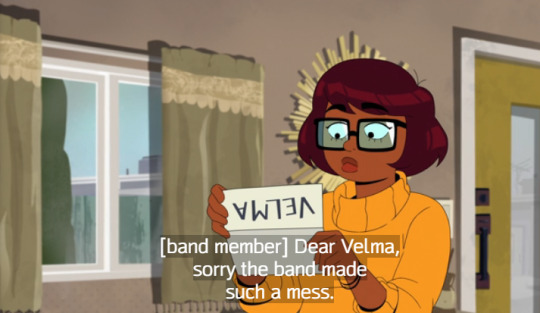
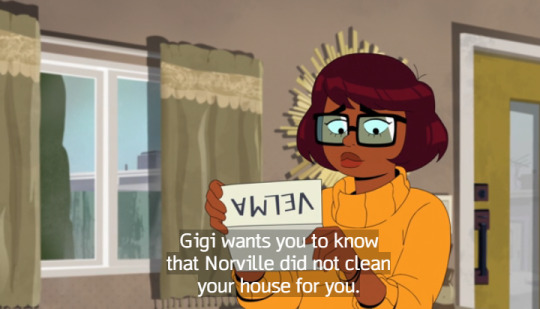
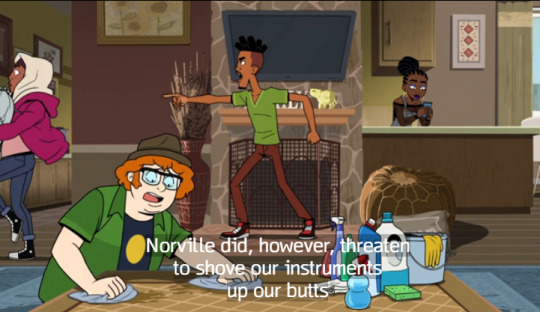
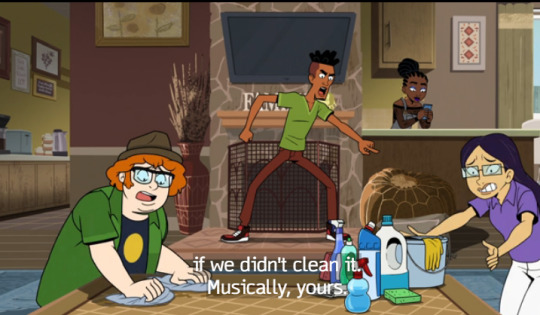
3 notes
·
View notes
Text
Hogwarts Legacy with a Jewish Lens
Additionally, the debate over whether the goblin character has its roots in antisemitism is wholly unaligned with Rowling’s professed views on Jews. In 2004, Rowling visited a Holocaust Museum and compared the hated “mudblood” and “half-blood” terms used in Harry Potter with the antisemitic propaganda of the Nazis: “If you think this is far-fetched, look at some of the real charts the Nazis used to show what constituted Aryan or Jewish blood.” Rowling has also gone on record saying that her evil character—Lord Voldemort—is modeled in part off of Hitler. Both comments won her comments of praise from Jewish organizations.
-https://momentmag.com/debunking-the-harry-potter-anti-semitism-myth/ [bolding by me]
Getting praised for modelling your villain after Hitler is a low, low bar.
So it’s no secret that in the criticism of the upcoming game Hogwarts Legacy, discussions of antisemitism have come up just as often as transphobia. This is thanks to the promotional material, which heavily teases a ‘goblin rebellion’ as a main part of the game’s plot.
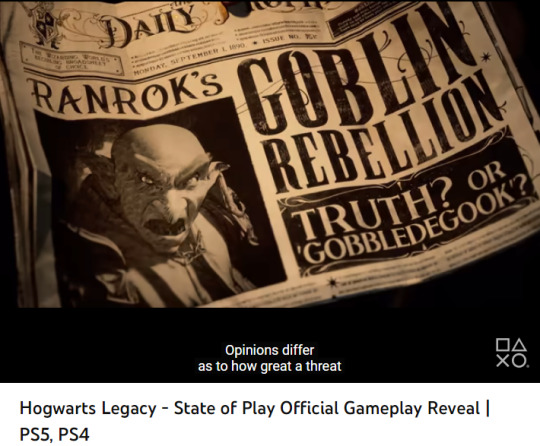
Actual Jewish criticism of Harry Potter seems to be thin on the ground. Most of what I can find talks about the depiction of the goblins. Other (older) articles talk about Jewish values found in the book series, especially as geared towards an Orthodox audience. Fandom studies focuses on how Jewish fans of the series have worked with Jewish characters and OCs, and how these fans have brought Jewishness into their fandom.
I’m an in-progress Jew by Choice (mikveh date is april ahhh). I’ve long been a student and critic of problematic media, but this is the first time I’m taking my criticism public. Given the apparent heavy focus on Harry Potter’s goblins in this game, Judaism seems like an excellent lens through which to begin this analysis.
There’s a lot to cover beyond goblins as well. Can Jewish wizards fit into Rowling’s universe? [Rowling has confirmed that she imagines many Jewish students at Hogwarts, tho only one is named in the book series, and has very little time or development] How does the world of Harry Potter draw from Jewish persecution for allegory, and what are the implications of doing so? How do the fanbase and auxiliary creators of Harry Potter overlook, excuse, or dismiss [intentional or unintentional] antisemitism? How does antisemitism intersect with the racism found in Harry Potter?
Is there even a place for Jewish characters in a game set in 1890s Britain? Expelled in 1290, Jews were only readmitted in 1655. Debates on Jewish naturalization went back and forth thru the 1700s. In the 1800s, Jews fought against legal exclusion, spearheaded by political leaders like David Salomons, the first Jewish mayor of London [and later an MP]. While this was going on, Jewish leaders were protesting spreading blood libel in Europe. There was also an exodus of Jews escaping the Russian Empire’s brutal pogroms. Many settled in Britain, and a new wave of anti-Jewish immigration sentiments arose.
Full legal emancipation for Jews was not granted until 1858. A number of Jews opposed emancipation, arguing that it would lead to assimilation into British Gentile culture and a loss of Jewish identity.
References:
https://www0.bostonglobe.com/ideas/2018/02/09/why-jewish-students-hogwarts-have-invisible/N3ZWz6JOZjzQhdXpVe2KmL/story.html
https://victorianweb.org/religion/judaism/gossman11.html
https://fandomwire.com/wb-set-to-lose-millions-as-harry-potter-fans-threaten-to-boycott-anti-semitic-hogwarts-legacy-game-for-showing-jews-as-greedy-child-abducting-goblins/
https://www.dailycal.org/2022/01/17/disenchanted-with-harry-potter-exploring-entrenched-antisemitism-in-fantasy-literature
https://journal.transformativeworks.org/index.php/twc/article/view/1312/2069
https://momentmag.com/a-moment-with-dov-krulwich/
4 notes
·
View notes
Text
Looking at other folks’ thoughts on Velma, and here’s something of note:
The best review I’ve seen yet. A review that really seems to get to the heart of why this show doesn’t work. A review I’m going to be quoting in the future?
Is from Doug Walker.
Which, if anyone is qualified to talk about failed comedy, it’s Doug, but I’m still surprised. He’s not trying to be funny in this video, he’s not trying to be an angry critic, and he’s poking right into the inner workings of this show. How a writing team with comedy chops screwed it up so badly. Why the problem isn’t the race-bending or the attitude or the lack of faith to the source material.
At one point he mentions that the show has ‘this wall of protective bullshit that's stopping it from being really funny or really clever.’
and he’s fucking right.
Honestly? I’d love to see more of this from Doug in the future. No Nostalgia Critic. No scripted rants or strange little skits made with Spirit Halloween costumes. No crunching or abusing other artists employed by Channel Awesome. Just Doug, drawing from all his experiences and failings as an artist, digging right into other media and giving it an honest and fair shake.
Link to that video: https://www.youtube.com/watch?v=Ort1fMUT6X4
#doing velma#doug walker#wasn't expecting him to come up#but hey#I've always been fascinated by his career as an artist#so many others have done excellent analysis of his work and failings#maybe one day I'll dig into that body of work too
17 notes
·
View notes
Text
So Velma has continued to haunt me long into the night.
I take it back. There is stuff we can learn from this. I mean, it’s likely stuff that has already been talked about, and I don’t know how much new stuff can come from a discussion about this show, but damnit I’m gonna try.
Several angles here:
(and p much all of these tie into corporate exploitation)
The race-swapped cast (and subsequent praise and backlash, predictable as always)
No Scooby in a show that is ostensibly in the franchise named for him
HBO and WB saying that all attention is good attention - hate watching and discussion brings $$$ in as reliably as praise
Oh G-d am I part of this machine for talking about this? (I’m not going to worry about this, otherwise this blog would not exist)
Capitalizing on nostalgia for old franchises
None of these angles are particularly interesting to me. They’ve been done to death. I’m not going to do them unless they come up naturally in the course of my analysis.
One angle I am interested in right now: what makes a franchise spin-off ‘adult’? When the word ‘adult’ gets used, what are the audience expectations? What does ‘adult’ mean to the people creating the thing, and what does it mean to the people watching it? How does an ‘adult’ spin-off fit into the existing franchise, and what new ideas can it bring to the table?
I feel like we need more material to work with. I’m gonna keep watching as these episodes drop, put my thoughts down after each batch, and then once it’s over, do one or two larger roundups and complete analyses. I think that’ll work as a blog format overall, because it’ll be interesting to see how things change in the process of experiencing the media, and what that all shakes out to.
3 notes
·
View notes
Text
I guess we’re doing this lol. Enjoy. If u can.
…was thinking of doing another piece of Problematic Media analysis to hold me over for a bit, poked a bit at the possibility of doing Velma, and after watching a few clips, noped away so hard
Velma might be a piece of problematic media, but I’m not honestly sure there is anything to be learned from it.
14 notes
·
View notes